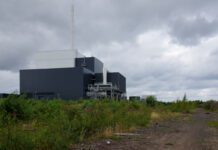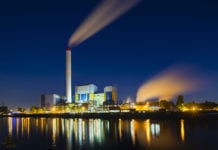Mayor of London, Sadiq Khan called – in late May – for the government to stop permitting the building of ‘archaic’ polluting waste incinerators as he outined his opposition to a proposed incinerator in Bexley, which is set to raise NOx pollution levels. One of the firms mentioned by the mayor, Cory Riverside Energy, has responded with an account of the situation as they see it, comments which are also included below

A press release from the Mayor’s office said Khan strongly believes that burning waste in incinerators worsens London’s already toxic air quality and hinders boroughs from reaching recycling and waste reduction targets.
London has the highest incineration rate (54 per cent) in the UK for management of local authority waste, yet the lowest recycling rate (30 per cent).
The focus must be on reducing waste, particularly plastic, and protecting residents from pollution. The Mayor is encouraging boroughs to help residents to recycle food, and stop buying needless plastic bottled water, which should help to reduce landfill and mean that only truly unrecyclable waste (e.g disposable nappies and composite packaging materials that combine card, plastic and foils which cannot be separated) would need to be incinerated.
There are already three incinerators in the capital – Bexley (in the same location as the proposed site), Enfield and Lewisham. Another is being built in Sutton and is due to open this year, while a further plant has been approved for development in Enfield, both of which were approved by ministers during the previous mayor’s terms.
City Hall has seemingly heard from worried Bexley residents and MPs who strongly oppose the plans and are concerned about the impact on the local area. The plant would emit more than four times as much harmful NOx as the existing local incinerator and the Crossness sewage plant combined. It could also emit arsenic, nickel and other metals that could damage the health of residents and workers both nearby and across the river.
The Mayor has reviewed the application by waste management company Cory and disputes claims that the incinerator will generate low-carbon heat and power and meet his minimum CO2 requirement for energy from waste facilities, which aims to reduce carbon emissions and help tackle London’s climate emergency.
There is also insufficient evidence to make the case that there are enough homes and buildings nearby that could use heat generated from the new incinerator. The existing incinerator facility (Riverside Resource Recovery Facility) on the site has demonstrated more than enough capacity to supply sufficient heat for existing and proposed homes and workplaces in the surrounding area.
The Mayor does not have powers to stop the incinerator because final approval for the facility lies with the government.
The Mayor is a statutory consultee and will oppose this application through representations made to the Planning Inspectorate, which will make a recommendation on the application to the Government. Today he outlined his opposition in a report to Secretary of State for Business, Greg Clark.
The Mayor of London, Sadiq Khan said: “London’s air is a toxic air health crisis and the last thing we need, in our modern green global city is another harmful waste-burning incinerator polluting our city. Emissions from incinerators are bad for our health, bad for our environment and bad for our planet. Instead of granting permission for an unnecessary new incinerator that will raise pollution levels in the boroughs of Bexley and Havering, the Government should focus on boosting recycling rates, reducing the scourge of plastic waste and tackling our lethal air. I am urging ministers to reject this proposal.“
Response: “incinerators are not the problem”
Dougie Sutherland, CEO of Cory Riverside Energy, said: “London faces challenges to its recycling and waste reduction targets, but incinerators are not the problem. Over two million tonnes of London’s non-recyclable waste is currently sent to landfill or shipped overseas, so there is a capacity gap that urgently needs investment.
“Our proposed Energy Park will play a significant part in addressing this shortfall and will also deliver a sustainable waste management solution for London, increasing renewable, low carbon energy generation and reducing greenhouse gas emissions. We will not have any detrimental effect on recycling rates, or the recycling targets set in adopted and emerging policy.
“EfW is already working successfully today in exactly the countries that the world is looking to as leading lights in tackling pollution and climate change. We need only look to the example of Copenhagen, a city which is often used as an example of best practice and aims to be net zero by 2025 as well as increasing its recycling rates to 70%. Energy from Waste plays a central role in achieving these goals, with a new facility recently opened in the city centre which doubles as a ski slope. If that isn’t a vote of confidence in this technology I don’t know what is. In Denmark and Sweden, landfill is the enemy. They have some of the highest levels of recycling and send close to zero waste to landfill.”
Sutherland also later added: “As part of the application process, we have fully assessed air quality and the results show the proposed Energy Park will not have any significant effect on air quality in any location. We have published the results of these assessments for scrutiny by anybody who is interested, as part of our Development Consent Order application. Separately, air quality impacts will also be independently scrutinised by the Environment Agency – as they are at our existing Belvedere facility, which has been operating well below the emission limits since starting operation in 2011. All emissions data will be made publicly available as is current practice with Cory’s existing facility. The Environment Agency will only award us the Environmental Permit required to operate if it is satisfied we can do so safely and meet emissions requirements.







